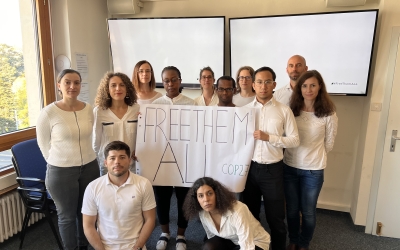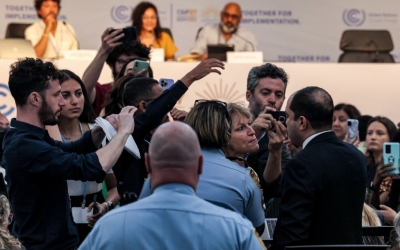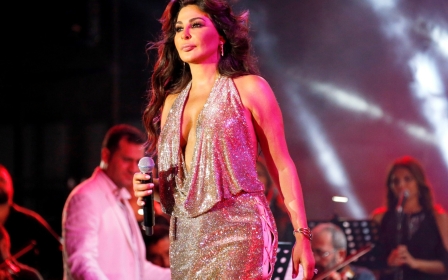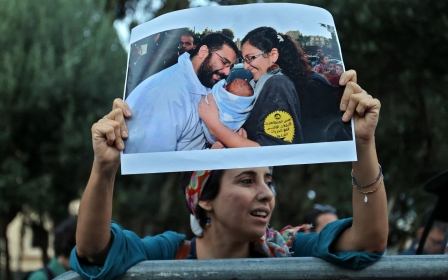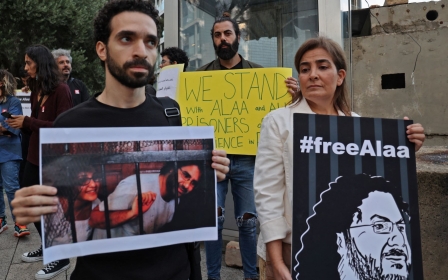Alaa Abd el-Fattah: Egyptian hunger-striker's family 'requests presidential pardon'
The sister of the British-Egyptian political prisoner Alaa Abd el-Fattah announced on Friday that she has formally requested Egypt's President Abdel Fattah el-Sisi's clemency to end her brother's ordeal.
"Attached is the text of the pardon request that I submitted today, confirming... my readiness to take all available legal methods that guarantee a solution to my brother's crisis," his sister Mona Seif wrote on Twitter. The letter is the second to be addressed by the family to the presidency since June, but this time Seif says it's a "personal plea" to President Sisi.
She cited the case of another political prisoner imprisoned in connection with the same case who received a pardon last month.
The letter comes as Abd el-Fattah escalated his hunger strike by refusing water with the beginning of the UN Cop27 climate summit held between 6 and 18 November in the Egyptian resort city of Sharm el-Sheikh.
The Public Prosecution on Thursday claimed that the detainee's health and "vital signs" were normal, but the family disputed the claims and requested "proof of life".
The family were informed on Thursday that authorities carried out a "medical intervention" with the activist, under judicial supervision. Egyptian Foreign Minister Sameh Shoukry told international media that Abd el-Fattah had been imprisoned after "a fair trial".
"The person in question has had a fair trial, has had legal representation and has been convicted by an impartial court as any legal system. There should be respect for the judicial system that is, I think, the issue of the separation of powers that we should all adhere to," he told CNN, without naming Abdel Fattah.
Since April, a commission launched by the Egyptian government has liaised the release of 766 political prisoners through a presidential pardon, according to Amnesty International. But the rights group also said that almost double that number have been detained in the same period for being perceived as Sisi opponents.
Abd el-Fattah was a leading figure in the 2011 Egyptian revolution and has spent eight of the past 10 years in jail on various charges.
He was sentenced to five years in prison for "spreading false news" in December 2019, in a trial widely condemned by human rights defenders.
US president 'concerned'
Meanwhile, Egyptian-American human rights defender Aya Hijazi announced on Friday that she started a sit-in in front of the Egypt embassy in Washington DC to demand Abd el-Fattah's release.
Hijazi herself was released from an Egyptian jail in 2017 after an international campaign and high-level diplomacy between Cairo and Washington under the Donald Trump administration.
The sit-in coincided with the visit by US President Joe Biden to Egypt to attend Cop27, in which he raised human rights issues with Sisi in a meeting.
Abd el-Fattah is among at least 60,000 political prisoners who have been detained in a brutal crackdown on dissent since Sisi seized power in a military coup in 2013.
The activist's plight has hit international headlines and a number of senior figures have publicly called for his release during the summit.
Meanwhile, Sanaa Seif, the activist's sister, took part in the event to shed light on his ordeal and campaign for his release. The campaign has prompted world leaders participating in the summit to show their support for Abd el-Fattah and call on President Sisi to intervene to secure his release.
UK Prime Minister Rishi Sunak had written to the family of the jailed activist ahead of attending Cop27, saying his government is committed to his release.
Similarly, former British Prime Minister Boris Johnson said the activist's continued detention is "a very sad case".
The UN rights chief Volker Turk on Tuesday also said Abd el-Fattah needed to be released, warning his life was "in great danger".
Later on Tuesday, German Chancellor Olaf Scholz also chimed in with calls for the activist's release.
Middle East Eye propose une couverture et une analyse indépendantes et incomparables du Moyen-Orient, de l’Afrique du Nord et d’autres régions du monde. Pour en savoir plus sur la reprise de ce contenu et les frais qui s’appliquent, veuillez remplir ce formulaire [en anglais]. Pour en savoir plus sur MEE, cliquez ici [en anglais].


